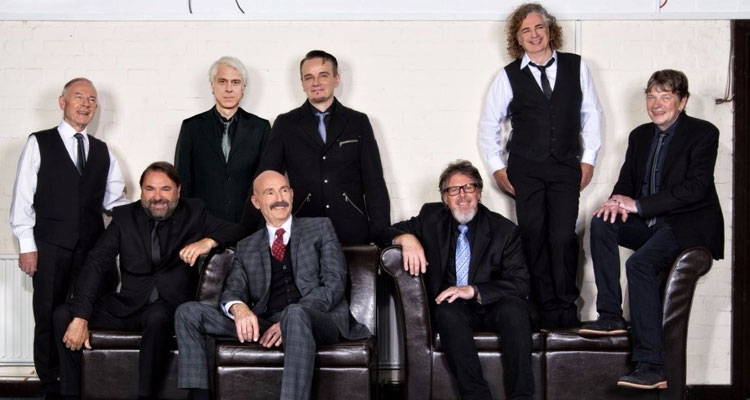The only thing worse than a drum solo is a pre-written drum solo with an actual title. But what if instead of one drummer, there were three? That’s how King Crimson opened Sunday’s show at Riverside Theater: “Devil Dogs Of Tessellation Row,” it was called, a baffling primer on the percussion clinic that would unfold throughout the night. As it turned out, the gaudy display of three shiny drum kits lining the front of the stage wasn’t as sonically distracting as it could’ve been, although when it occasionally was, it only served to drive home the fact that any of the three —Gavin Harrison, Pat Mastelotto, or Jeremy Stacey—could’ve handled drum duties alone, and without ever overpowering the rest of the band. Still, the interplay between them was at times a wonder to behold, and the band’s more varied setlists and slightly expanded repertoire on this tour seem to make for looser performances than three years ago. The band still appeared stiff and stuffy, particularly under the unflinching, colorless light scheme, but the music got wild.
Crimson’s on-again, off-again history hinges on its lone mainstay, guitarist Robert Fripp, who revived the project in essentially its current form in 2014 for a tour that focused heavily on his ’70s catalog, particularly the landmark 1973 album Larks’ Tongues In Aspic. Sunday’s show branched out more into the rest of the Crimson spectrum, with only the mid-’90s Thrak era being inexplicably unrepresented. There are a couple of lineup changes from the 2014 run: Stacey, who has played with a slew of different artists ranging from prog to pop to Americana, took Bill Rieflin’s drum seat last year; Rieflin, meanwhile, had shifted to keyboards, but was unable to join the group for this fall tour, so Chris Gibson (League Of Crafty Guitarists) has stepped in.
As the group revved up with “Neurotica” and “Pictures Of A City,” they sounded like a timeless experimental prog-rock unit, as fierce and dynamic as any of their many modern imitators and unbeatable on a technical level. Then “Cirkus” felt a bit labored, and overactive percussion hampered an otherwise impressive rendition of “Fallen Angel.” The tender “Epitaph” was about the last song that would demand extra drums, except as it extended well beyond its traditional formula it became something entirely more brazen and urgent, and the extra drumming contributed undeniably to the power of this new creation. There were still a couple of problems, though: for one, Tony Levin’s virtuosic low end was getting chewed up inside the mix; it was there, but indistinct and too quiet throughout most of the show. Also, this first prominent appearance of Gibson’s mellotron sounded quite thin, like a low-grade digital copy of a real mellotron and quite out of step with the more modern sonics of this ensemble.
The first set began to drag a bit in the middle, with the stilted new-school sequence of “Radical Action (To Unseat the Hold of Monkey Mind)” and “Meltdown,” both essentially ’70s/’80s Crimson retreads, and “Islands” came off too much like Dave Matthews Band for comfort. The antidote arrived in the form of parts I and II of “Larks’ Tongues In Aspic,” which brought the crowd to its feet. Fripp’s influence on the history of metal music is encapsulated well in these compositions, which also allowed for more frenzied improvisation. With eyes closed, one could easily be transported to 1973 and the excitement that came with the radical new ground this music was breaking.
The band’s second set began with a delightful showcase of the three drummers called, naturally, “Hell Hounds Of Krim,” more of a lark than a clinic and enough to spark incredulous laughter as the three men functioned as different limbs of a single entity. The energetic piece led somewhat awkwardly into “Moonchild,” but no one was complaining as this ancient prog ballad recalled the band’s earliest days along with the bombastic “In The Court Of The Crimson King,” and here the mellotron rang out in appropriately archaic fashion.
There were no significant lulls in this second set. The ’80s gem “Indiscipline” was an exuberant pick from an underrepresented period of the group’s history, and the energy only built from there as the band delved back into the early ’70s with epic renditions of both “Lizard” and “Easy Money,” and a wide-ranging, breathtaking version of “Starless.” Fripp was always the industry leader in swapping out singers, brilliantly engineering one aspect of his band’s longevity by never letting fans get used to a frontman for long enough to lament his departure. Jakko Jakszyk has been with the group for the past four years, and he did an admirable job with material from each previous Crimson vocalist while jiving exceptionally well on guitar with Fripp’s more abstract stylings.
The secret weapon of the show was multi-instrumentalist Mel Collins, who returned to Crimson in 2014 after a 40-plus-year absence. It was his flute and saxophone work more than anything that conjured the heady days of the band’s ’70s peak, reminding fans of a time when jazz, classical, and rock merged in an aggressive, unpretentious manner via these songs that still stand the test of time, and evidently still inspire feats of musical exploration from the men tasked to keep playing them. Token new tunes notwithstanding, Crimson isn’t shooting for relevance, but as a still-unique force of music, the band isn’t quite ready to be relegated to the cheap nostalgia heap, either.

